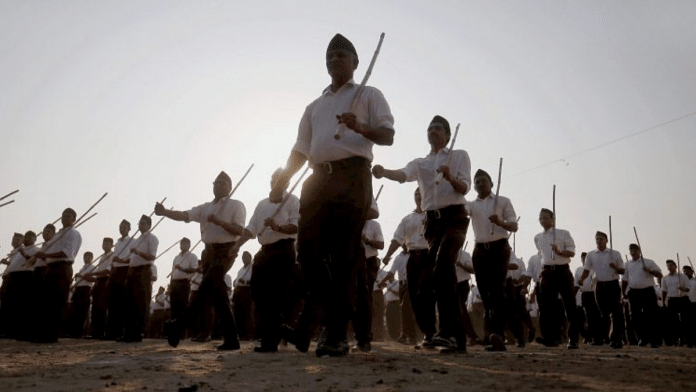New Delhi: The Akhil Bharatiya Pratinidhi Sabha (ABPS), the top decision-making body of the Rashtriya Swayamsevak Sangh (RSS), is all set to hold its annual meeting in Bengaluru on 19-20 March.
In recent years, there has always been a great deal of buzz and speculation around these meetings, especially since the Bharatiya Janata Party (BJP), an ideological mentee of the RSS, came to power in 2014.
Due to lack of an understanding about the structure and functioning of the ABPS, observers and commentators often end up interpreting these organisational meetings from a unidimensional perspective, with the RSS-BJP relationship as the reference point. The reality is quite different, though.
The structure of the ABPS itself defines its functioning. It is, therefore, important to understand it, although it may appear to be a little complex for a rank outsider.
Also read: Material mindset causing ‘unchecked desires’, stress and divorce, says RSS
Who all participate in the meeting & what all is discussed
The RSS functionaries at prant (state/province) level and above, take part in the ABPS meetings. In addition, representatives of more than three dozen organisations, which are ideological mentees of the RSS, also participate.
The list of these organisations include Vishwa Hindu Parishad, Sewa Bharati, Vanvasi Kalyan Asram, Bharatiya Mazdoor Singh, Bharatiya Janata Party, Akhil Bharatiya Vidyarthi Parishad, Vidya Bharati, Bharatiya Shikshan Mandal and Swadeshi Jagran Manch.
The meeting generally lasts between two and four days, and is attended by RSS brass, including the sarsanghchalak (chief mentor) and sarkaryavah (general secretary), who preside over it. There are several sessions during the day where issues are discussed, presentations about RSS activities on the ground are put forward and future plans made.
A report on the status of the RSS is also presented at the meeting by the sarkaryavah, and the challenges faced by the nation as well as a way forward for the organisation are also discussed. The representatives of different organisations also share an overview of their works, highlighting the new initiatives they have undertaken.
The objective is to replicate good practices in social work across sectors and throughout the country, while facilitating synergy among various organisations and initiatives taken at different levels by the swayamsevaks.
Also read: The media thinks the RSS is obsessed with the BJP. It couldn’t be more wrong
ABPS meet to elect a new sarkaryavah this year
The members of the ABPS go back after every meeting with a message from the brass as to what is going to be the broad direction of the RSS work for the coming year.
This message is then percolated down to the shakha-level through a series of meetings. The shakha is the basic unit of the RSS, which is held daily for an hour at more than 60,000 places across the country. It is broadly a one-hour meeting of RSS volunteers (swayamsevaks) where they take up activities aimed at creating people with noble character who keep the nation ahead of everything.
The ABPS usually also passes resolutions on issues of national significance, spelling out the RSS’ stand and approach on them. In the past, it has passed resolutions on issues ranging from cow protection, Sabarimala to India’s foreign policy.
The ABPS also forms an electoral college as according to the RSS’ constitution, the sarkaryavah has to be elected after every three years. The election of the sarkaryavah has always been unanimous ever since the process started in 1950 when ABPS met for the first time and elected Bhaiyya ji Dani to the position. This year the ABPS meet will elect a new sarkaryavah.
Over 1,000 members
The ABPS comprises delegates of RSS shakhas from all over the country — sanghchalaks (mentors), karyavahak (chief executive) and pracharaks (full-time workers) of kshetras (regions) and prantas (provinces).
It also comprises members of Akhil Bharatiya Karyakari Mandal, another key decision-making body of the RSS, although a smaller body than ABPS.
According to the constitution of the RSS, “The ABPS shall review the work of the sangh and lay down its policies and programmes. Sarkaryavah may invite certain categories of workers to attend the meetings of the ABPS. However, such special invitees shall not be entitled to vote.
“There are certain permanent invitees in the ABPS that include heads of different spheres of sangh work in Kshetra Karyakari Mandals (Regional Executive Councils) and Kshetriya Pracharak Pramukh (Regional in-charge of full-time workers) and Prant Pracharak Pramukh (State level in-charge of full-time workers).”
The ABPS is supposed to meet at least once a year. Every third year, the meeting is held in Nagpur. Last year, the ABPS meet, which was scheduled to be held in Bengaluru, was postponed due to the nationwide Covid-19 lockdown.
Had this meet not been postponed, then this year’s meeting would have been held in Nagpur. But the RSS decided that since the meeting in Bengaluru couldn’t be held last year, so it would be held in Bengaluru this year.
The ABPS currently has more than 1,000 members, but due to the prevailing situation of the pandemic, the meeting would be physically attended by only a handful of delegates, while the rest would participate online from their states, districts and regions.
The last ABPS meeting was held in 2019 in Gwalior, Madhya Pradesh, where sarkaryavah Bhaiyya ji Joshi mentioned in his annual report that the number of daily shakhas stood at 59,266. In March, 2018, this number was pegged at 58,967.
The writer is research director with the Delhi-based think tank Vichar Vinimay Kendra. He has authored two books on RSS.
(Edited by Debalina Dey)
Also read: Why covering RSS top decision-making body’s annual meeting is a nightmare for journalists



